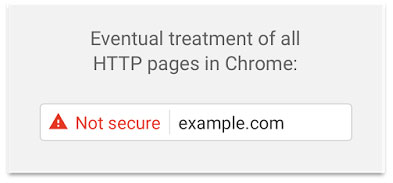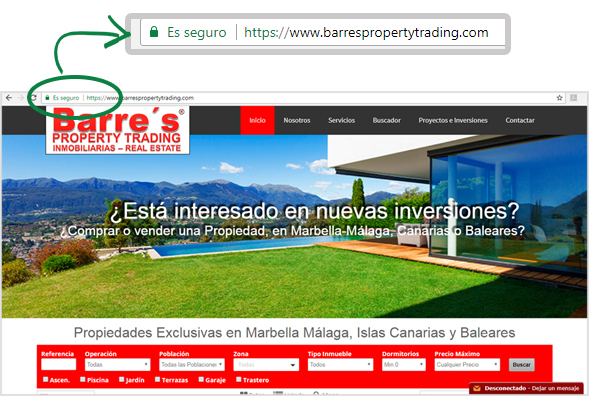SSL Certificate.
SSL CERTIFICATES FOR YOUR WEB PAGE.
Google will penalize in 2018 the webs that do not have SSL Certificate.

SSL certificates are necessary for any website that handles confidential information, as it will guarantee the security of data transmission when encrypted.
WHAT ARE THE SSL CERTIFICATES AND WHAT IS THEIR FUNCTION.
SSL is the acronym for the English acronym «Secure Socket Layer» (or «safe ports layer»), a security protocol for encrypting communications between a web server and the web browser of the person who enters that web.
This reduces the risk of stealing data that is sent over the network, such as personal data forms, credit card numbers ...
SSL PROTOCOLS HAVE TWO FUNCTIONS:
1. Encrypt information: all data that is communicated via the internet, between the web and the user (or vice versa) are encrypted using a security key of 128 bits in length.
2. Authenticate the identity: the SSL certificate will give us the guarantee that the website is not false since the issuance of the certificate is like an electronic signature that proves the identity and credentials of the website.
HOW DO WE KNOW THAT A WEB HAS THE SSL CERTIFICATE?
In a very simple way, we can check if a web has the SSL protocol installed:
1. Prefix URL: In the url of the browser, instead of http, the web address will be https.
2. Padlock icon: normally to the left of the url, depending on the browser, a padlock will appear.
3. A stamp of confidence. In some websites if you wish you can put a stamp, which will link to the certification company.
4. Green address bar. Some browsers change the color of the address bar if it is SSL or not.
TYPES OF SSL CERTIFICATES AND WHO ISSUES THEM?
There are many types of security certificates on the Internet, according to certain characteristics, such as the desired use of the same, validation degrees, web domain names or subdomains, types of guarantees, traffi...
WHO IS RECEIVING AND RENEWING SSL CERTIFICATES?
The SSL Certificates can only be issued by the certification authorities (CA), which have the official permits to certify requests, verify them and maintain reports on the status of the certificates issued.
Each authority issues a «Certification Practice Statement» or declaratory certificate (CPS) where the verification procedures are established. There are a large number of private and public certifiers. The best known are VeriSign, Thawte, GeoTrust, RapidSSL or Symantec.
HOW TO INSTALL AN SSL CERTIFICATE?
You have to buy it with a CA company, download the script and add it to the relevant web pages, modifying the codes of the web pages.
Although the normal thing is to acquire it through the provider of domains or web hosting, that current as distributors of the CA companies, simplifying their installation for the normal user.
IS IT REQUIRED TO INSTALL THE SSL CERTIFICATE?
It is mandatory, if you have an online store or a development that requests some type of password or payment credential, it is not mandatory otherwise; but it is a way to give security and confidence to our online visitors, security in the transmission of data is an essential requirement for electronic commerce, almost 70% of online shoppers have stopped buying in a virtual store because they have not trusted on the page and decide to contact another provider that gives them greater security.
WHAT IF I DO NOT HAVE HTTPS?
Browsers with the desire to improve the security of web pages and eliminate fake websites, are starting to show icons in the address bar with the word "Not Safe", punishing with this message to websites that do not have it.

Google since January 2017, has forced its advertisers to put an SSL certificate on web pages, and in its new browser Google Chrome 56, is warning as "Not Secure" the websites that lack the Https. Mozilla Firefox has also started to tag sites with HTTPS security certificate as safe, showing a green mark or a gray mark if they are not secure, visible in the address bar. And soon you will start to show this warning:

This "Not safe" label will be displayed on any page that does not contain the certificate.
Also more and more platforms require to have the certificate, to operate with them, for example Facebook forces for the integration with its platform, that the domains are under the Htpps environment, as the utility of adding the real estate search engines.
HOW DOES IT AFFECT THE POSITIONING AND PROFITABILITY OF MY WEB?
Very negatively, for two reasons: First, because there will be more and more Internet users, who leave our website, due to the safety warnings of the browsers.
And second, because the increase in the rate of rebound (abandonment) of the web and the times of permanence in it, will affect the traffic, which will be reflected in a loss of positions in the SERP (pages of results in the engine of search).
In short, with this measure, Google materializes the notices that it has been giving on the need for a secure website, and that having the SSL certificate is going to be a decisive factor in the search engine ranking.
HOW MUCH?
The Certificate, like the domain, must be renewed every year so that it does not expire, in CA-approved entities.
In Foro Empresarial we install CA Comodo Possitive SSL ™ security certificates, with 256-bit encryption, 2048 bit root (RSA) compatible with 99% of browsers, which guarantee 100% secure data transmission.
The price of the service is broken down as follows:
- 256-bit SSL Security Certificate: € 59.00 + VAT (annual payment).
-Installation and adaptation to website: Free.
Total: € 59.00 + VAT / YEAR
Examples of real estate websites that already have the SSL Certificate installed:

BARRE'S PROPERTY TRADING
https://www.barrespropertytrading.com
AVENIDA INMOBILIARIA
https://www.webavenida.com
DONCEL AGENCIA INMOBILIARIA
https://www.inmobiliariadoncel.com
ACANTO INMOBILIARIA
https://www.acantoinmobiliaria.com



